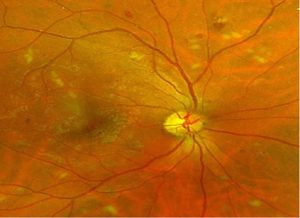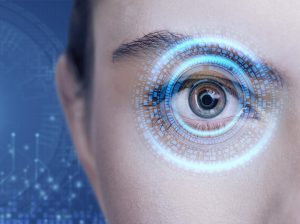AI and screening: truly a revolution! Artificial intelligence (AI) is rapidly transforming the landscape of ocular diagnosis, bringing significant innovations in screening for diseases such as diabetes and diabetic retinopathy. As the prevalence of diabetes increases globally, the need for efficient and accurate diagnostic tools is more pressing than ever.
AI Performance in Screening
Artificial intelligence is having a major impact in the field of eye screening, particularly for the diagnosis of diseases such as diabetic retinopathy. AI's ability to rapidly analyse large volumes of visual data is, in fact, improving the accuracy and timeliness of diagnoses, leading to more effective treatment and an overall improvement in patient care.
Screening for Diabetic Retinopathy
 The screening for diabetic retinopathy are an essential tool for monitoring and preventing the onset of ocular complications of diabetes, of which diabetic retinopathy is the most frequent complication that, left untreated, can lead to severe visual impairment.
The screening for diabetic retinopathy are an essential tool for monitoring and preventing the onset of ocular complications of diabetes, of which diabetic retinopathy is the most frequent complication that, left untreated, can lead to severe visual impairment.
Artificial intelligence can significantly improve this process.
- Automated analysis: as AI can analyse retinal images with an accuracy that equals or exceeds that of human doctors.
- Main advantages: Reduces diagnosis time and frees up healthcare resources for other critical tasks.
- Real example: Some hospitals have integrated AI systems that identify retinal lesions with higher accuracy than 95%.
AI and Eye Screening in the Real World
In the real-world context, artificial intelligence is proving its effectiveness in eye screening through various pilot projects around the world, which are tangible proof of the potential of AI.
- Implementation: Many hospitals use AI to examine eye images, reducing the workload for ophthalmologists.
- ResultsStudies have shown a significant reduction in diagnosis time and increased accuracy.
- BenefitsAI technology makes it possible to identify patients at risk more quickly, facilitating early intervention.
In the specific case of the diagnosis of diabetic retinopathy, the performance of the DAIRETan AI-based machine learning algorithm, with that of ophthalmologists and specialised personnel.
DAIRET demonstrated optimal sensitivity in detecting cases of diabetic retinopathy (moderate to severe) compared to human operators, although with low specificity due to the high number of false positives, which could be a cost-effectiveness limitation to its large-scale use.
Implementing AI in Healthcare
The implementation of artificial intelligence in healthcare requires a considered and responsible approach. Initiatives such as the TRAIN project aim to integrate AI into healthcare systems so that it is safe, effective and accepted by both patients and healthcare professionals.
TRAIN European Initiative
The TRAIN European Initiative focuses on the responsible integration of AI in healthcare through a series of measures designed to ensure the reliability and acceptance of the technology.
- Systemic approachTRAIN aims to develop guidelines and standards for the use of AI in healthcare.
- CollaborationIt involves various stakeholders, including researchers, health professionals and engineers.
- Objectives: Ensuring that AI is used safely and effectively in different healthcare settings.
This initiative not only promotes the responsible use of AI, but also seeks to overcome barriers to adoption through training and awareness-raising.
Towards a Responsible Artificial Intelligence
Moving towards a responsible use of artificial intelligence in healthcare is crucial to maximise the benefits of the technology while minimising the risks.
- Ethical developmentAI algorithms must be designed with privacy and data security in mind.
- Continuous monitoring: A system of continuous evaluation is essential to ensure that IA functions as intended.
- Training: Healthcare professionals must be trained to use and understand AI technologies effectively.
Patient Confidence in Health Systems
Patients' trust in healthcare systems is crucial for the adoption of AI. Patients need to feel that AI technologies are safe, effective and transparently managed to be widely accepted.
Impact of AI on Trust
The introduction of artificial intelligence in healthcare services can influence patient confidence in various ways.
- Positive outlook: AI can improve diagnostic accuracy, increasing trust in the healthcare system.

- ChallengesFear of reduced human intervention can generate mistrust.
- Solutions: Clear communication about the benefits and limitations of AI can alleviate concerns.
A transparent and patient-centred approach is essential to build and maintain trust in AI systems.
Communication and Transparency in AI
The transparency is crucial to allay fears associated with the use of AI in healthcare and to ensure that patients feel safe in its use.
- Clear information: Provide patients with detailed information on how AI is used.
- Ethical implicationsOpen discussion of ethical implications and security measures.
- Patient involvement: Including patients in decision-making processes can improve trust and acceptance.
Regulation of AI in Healthcare
The regulation of AI in healthcare is crucial to ensure that technologies are safe, effective and used ethically. Regulations must evolve in step with technological innovation to be effective.
European regulations on AI
The European Union is developing a regulatory framework that addresses the specificities of AI in healthcare, with the aim of ensuring security and transparency.
- Strict rulesEuropean regulations set high standards for the quality and safety of AI technologies.
- Data Protection: It is essential to ensure that patient data are treated securely.
- Legal implications: Compliance with legal regulations is essential for the implementation of AI.
This framework aims to protect patients and promote responsible innovation.
Artificial Intelligence in Biomedicine
Artificial intelligence in biomedicine offers unique opportunities to improve research and healthcare, but requires careful regulation to manage the risks.
- InnovationAI technologies can accelerate drug discovery and improve personalised therapies.
- Ethical challengesEthical issues related to privacy and informed consent must be addressed.
- CollaborationCooperation between researchers, regulators and patients is essential for successful implementation.
Through a regulated and collaborative approach, AI can bring significant changes to the biomedical landscape.
- van Genderen ME, Kant IMJ, Tacchetti C, Jovinge S. Moving Toward Implementation of Responsible Artificial Intelligence in Health Care: The European TRAIN Initiative. JAMA. 2025 May 6;333(17):1483-1484. doi: 10.1001/jama.2025.1335. PMID: 39928513.
- Burlina S, Radin S, Poggiato M, Cioccoloni D, Raimondo D, Romanello G, Tommasi C, Lombardi S. Screening for diabetic retinopathy with artificial intelligence: a real world evaluation. Acta Diabetol. 2024 Dec;61(12):1603-1607. doi: 10.1007/s00592-024-02333-x. Epub 2024 Jul 12. PMID: 38995312.
